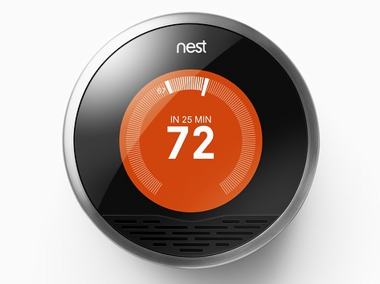Why Honeywell Is Suing Nest Labs
Honeywell International filed a patent-infringement lawsuit on Palo Alto-based Nest Labs yesterday, alleging that Nest’s relatively new digital thermostat encroaches on Honeywell’s patented technology.
You might be thinking: A thermostat’s a thermostat … right?
In Honeywell’s view, it’s not so simple. In the complaint, filed in a U.S. district court in Minnesota, the maker of aerospace systems, consumer products and technology solutions identified seven patents it believes Nest Labs infringes on.
Honeywell is also seeking damages from Best Buy, which features and sells Nest’s product in home-energy departments around the U.S. (Best Buy also sells Honeywell programmable thermostats.)
Nest Labs was recently launched by Matt Rogers and Tony Fadell, a former Apple executive who worked on the iPod. Last fall, Nest Labs began selling the Nest Learning Thermostat, a buzzed-about, easily programmable “smart” thermostat that uses the same wheel interface as the original iPod. The device can be controlled from a user’s smartphone, tablet or Web browser, and Fadell has been quoted as saying the Nest will save users up to 30 percent off their utility bills. With Nest, the uncool thermostat suddenly became a hot item.
Nest Labs did not respond to requests for comments on the suit, except to release a statement yesterday, saying they had not yet reviewed the actual filing, and that the company will provide comment once they’ve had the opportunity to review it.
Speaking for Honeywell, Bruce Eric Anderson, the company’s director of external communications, expounded on Honeywell’s statement from yesterday, saying that intellectual property is a “part of what Honeywell is as a company. We have 20,000 engineers that come here every day and it’s about protecting those individuals. This suit is not unique,” Anderson added.
Rather than go through the filing patent by patent, here are a few of the key sticking points of the suit:
First, Honeywell points out that it commercialized the first adjustable thermostat that allowed users to sleep through the night without having to manually turn their furnaces on and off; and that it is a global leader of innovative thermostats, and created the iconic “round” thermostat that’s now featured in the Smithsonian museum collection.
Honeywell goes on to mention more recent innovations, including its Prestige 2.0 Comfort Systems and RedLINK Wireless Comfort Sytems. More on the Prestige in a bit.
In the section titled “Acts Giving Rise to the Action,” the Honeywell filing points to various features of the Nest thermostat that have been promoted by Nest Labs and Best Buy as “innovative,” including the ability to connect the device to the Internet, store private data and control the Nest remotely through a Wi-Fi connection. Honeywell also takes issue with Fadell and Rogers having said that there hasn’t been any real innovation in decades in the thermostat space, though the sources of this quote and others are unclear.
Honeywell alleges that Nest Labs does not appear to have originated the design or functionality of the Nest thermostat — and says the key functional features at the core of the device are the results of years of research and development that culminated in patents owned by Honeywell.
For example, Honeywell’s complaint says, the fact that the Nest thermometer came with a patented “question system” — “What are the lowest and highest temperatures you’d like when you are away?” — is not new. Honeywell’s Prestige thermostat, introduced in late 2008, also incorporates an “interview-based interface.”
Honeywell also says that controlling a thermostat remotely through the Internet is not a Nest Labs innovation.
Interestingly, General Electric also offers consumers — as part of a home-energy management system — the ability to remotely control a GE “smart” thermostat from a smartphone or home computer. “Connect seamlessly to your programmable thermostat to remotely adjust your home climate,” says GE’s Web page for this feature.
When I asked Anderson whether Honeywell had ever examined GE’s system, he simply said, “I don’t know. I’m not familiar with that product.”
In the filing, Honeywell also references this AllThingsD video from last November as showing evidence that Nest Labs was examining “numerous” Honeywell thermostats in its research, indicating that Nest — which it calls a “well-funded, sophisticated company” — was well aware of Honeywell’s contributions to the thermostat industry.
So, Honeywell says, it has suffered and will suffer monetary damages and irreparable harm as a result of Nest Labs’s infringements, as well as from Best Buy’s infringements by using, offering to sell and/or selling the Nest device.
Since we don’t have a more detailed response from Nest Labs yet, it’s hard to know how this will play out. It’s also unclear whether Honeywell contacted Nest Labs prior to filing the formal suit.
Ed Weisz, a senior intellectual property lawyer at the firm of Cozen O’Connor (which is not involved in the Honeywell suit), says that most cases like this one result in a settlement. However, if it is determined that there has been a patent infringement, Weisz says, Honeywell could seek an injunction — which the courts may be more likely to grant, because there’s actually a product already out on the market.
Weisz also said that, while Best Buy is enjoined in the suit, he doesn’t think the retailer will be on the hook for additional damages, as their sale of goods — even ones that might infringe on IP — will be covered by the Uniform Commercial Code.
“It’s way too premature to have any read on the merits of this,” Weisz said.
What we do know is that in Silicon Valley — and in Honeywell’s case, outside of the Valley, too — tech-patent lawsuits are hardly uncommon, especially in the smartphone and tablet market.
We’ll keep you posted as this story evolves.










